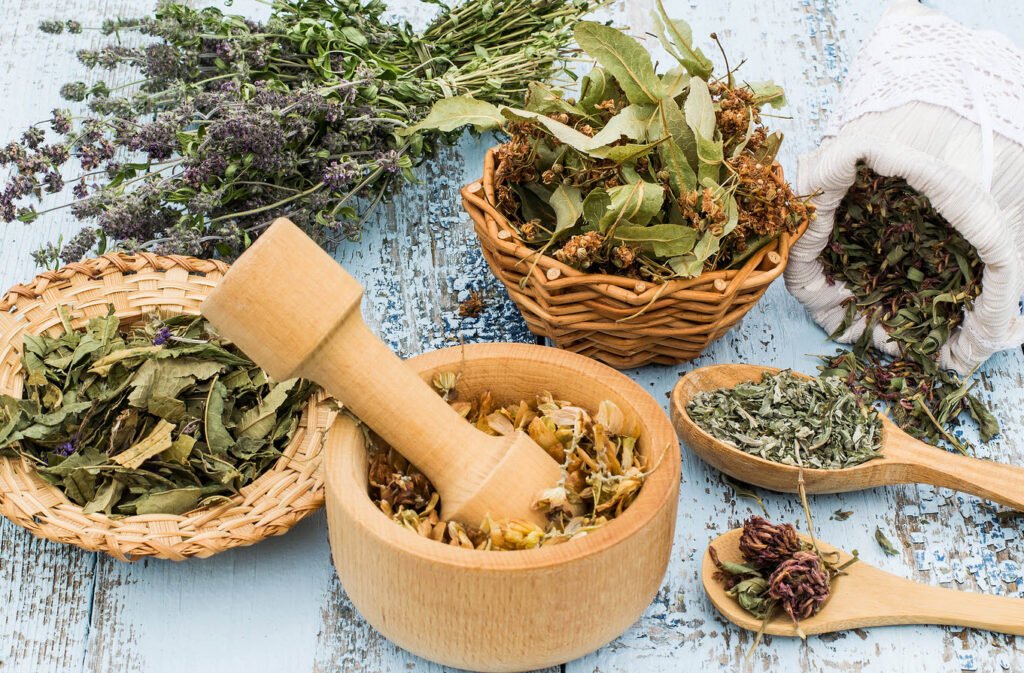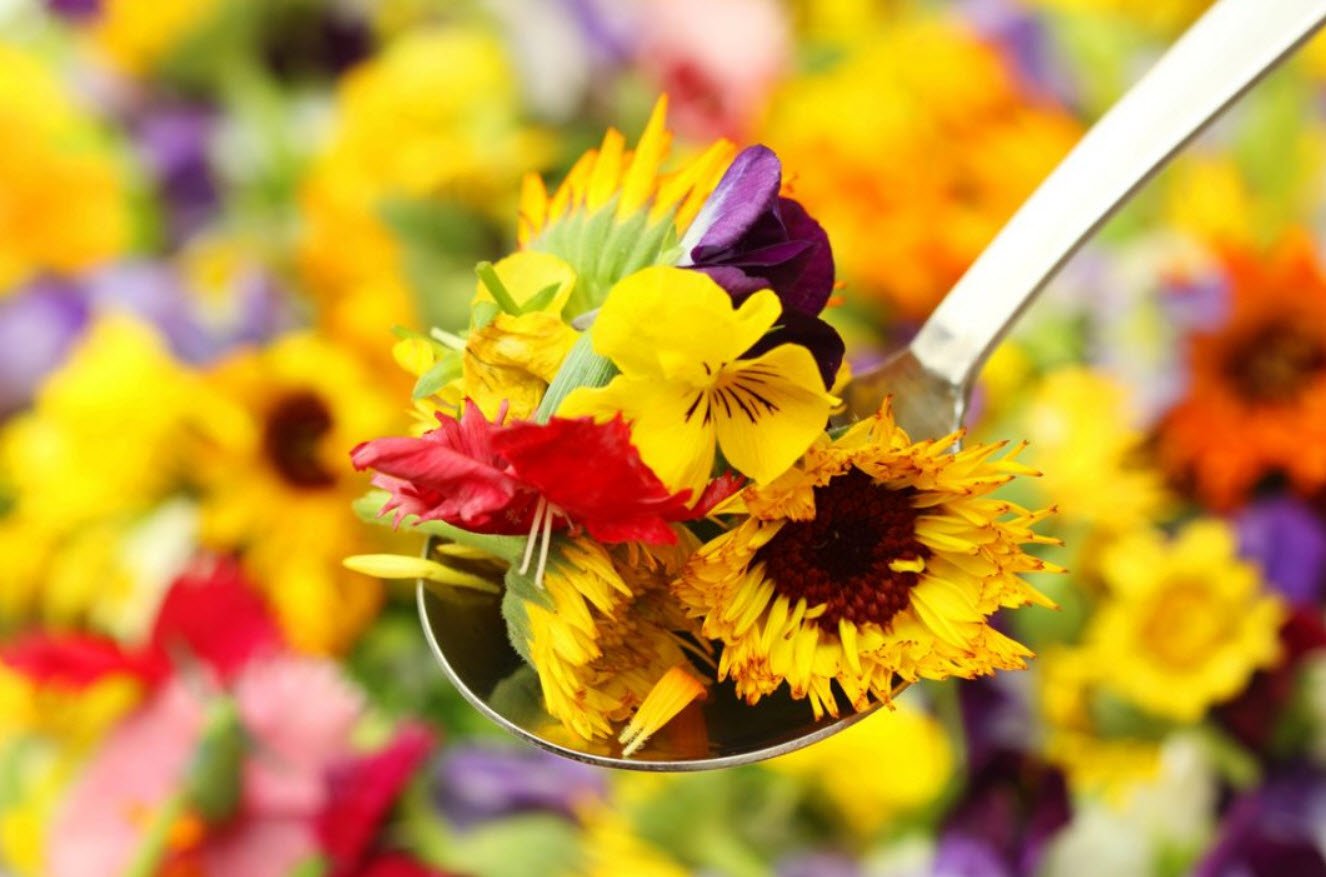
Gardening is not only a soothing hobby but also a source of nourishment and wellness. What if we told you that your garden could also be your personal pharmacy? Medicinal plants have been used for centuries to treat various ailments and promote overall well-being.
By cultivating these 34 medicinal plants in your garden, you can harness the power of nature to support your health naturally.
- Aloe Vera
- Lavender
- Marigold
- Basil
- Green Tea
- Dill
- Garlic
- Onions
- Stevia
- Cloves
- Rue
- Sage
- Licorice
- Thyme
- Parsley
- Ginger
- Turmeric
- Ginseng
- Dandelions
- Rosemary
- Lemongrass
- Safflower
- Chamomile
- Hibiscus
- Peppermint
- Wheatgrass
- Chives
- Arrowroot
- Wintergreen
- Oregano
- Marjoram
- Tea Tree
- Lemon Balm
- Winter Savory
1. Aloe Vera (Aloe barbadensis miller)
Aloe vera is well-known for its soothing properties, particularly for burns and skin irritations. It can also be ingested for digestive health.
2. Lavender (Lavandula angustifolia)
Lavender is famous for its calming aroma and is used in aromatherapy. It can also be infused into teas and used to alleviate stress and anxiety.
3. Marigold (Calendula officinalis)
Marigold, or calendula, has anti-inflammatory properties and is often used in skin creams and ointments for wound healing and skin irritations.
4. Basil (Ocimum basilicum)
Basil is more than just a tasty herb. It has antibacterial properties and can be used for respiratory health and digestion.
5. Green Tea (Camellia sinensis)
Green tea is rich in antioxidants and is celebrated for its potential to boost metabolism and reduce the risk of various diseases, including cancer.
6. Dill (Anethum graveolens)
Dill is not only a flavorful addition to your dishes but also helps with digestion and can relieve gas and bloating.
7. Garlic (Allium sativum)
Garlic has numerous health benefits, from its antimicrobial properties to its potential to lower blood pressure and cholesterol levels.
8. Onions (Allium cepa)
Onions contain antioxidants and anti-inflammatory compounds that can boost your immune system and reduce the risk of chronic diseases.
9. Stevia (Stevia rebaudiana)
Stevia is a natural sweetener that doesn’t affect blood sugar levels, making it a great alternative for those with diabetes.
10. Cloves (Syzygium aromaticum)
Cloves are known for their antibacterial and anti-inflammatory properties. They can be used to alleviate toothaches and digestive discomfort.
11. Rue (Ruta graveolens)
Rue has a long history in traditional medicine and can be used as an antispasmodic and to soothe digestive issues.
12. Sage (Salvia officinalis)
Sage has antimicrobial properties and can be used to ease sore throats and menopausal symptoms.
13. Licorice (Glycyrrhiza glabra)
Licorice root can help soothe coughs and digestive discomfort. It is also known for its anti-inflammatory properties.
14. Thyme (Thymus vulgaris)
Thyme is a potent herb with antimicrobial properties and is often used for respiratory and digestive health.
15. Parsley (Petroselinum crispum)
Parsley is more than a garnish; it’s rich in vitamins and antioxidants, aiding in digestion and kidney health.
16. Ginger (Zingiber officinale)
Ginger is renowned for its ability to alleviate nausea, aid digestion, and reduce inflammation.
17. Turmeric (Curcuma longa)
Turmeric contains curcumin, a powerful anti-inflammatory compound, making it a staple in natural medicine.
18. Ginseng (Panax ginseng)
Ginseng is an adaptogenic herb that can boost energy, reduce stress, and improve overall well-being.
19. Dandelions (Taraxacum officinale)
Dandelions are not just weeds; their leaves, roots, and flowers can be used to detoxify the liver and promote digestive health.
20. Rosemary (Rosmarinus officinalis)
Rosemary has antioxidants that can boost memory and concentration, and it’s also used for its anti-inflammatory properties.
21. Lemongrass (Cymbopogon citratus)
Lemongrass has a refreshing aroma and can be brewed into tea to aid digestion and reduce anxiety.
22. Safflower (Carthamus tinctorius)
Safflower has anti-inflammatory properties and can be used to alleviate menstrual cramps and promote heart health.
23. Chamomile (Matricaria chamomilla)
Chamomile is a gentle herb used to promote sleep, ease anxiety, and soothe digestive discomfort.
24. Hibiscus (Hibiscus sabdariffa)
Hibiscus tea is not only refreshing but also rich in antioxidants and can help lower blood pressure.
25. Peppermint (Mentha x piperita)
Peppermint is known for its soothing properties and can relieve headaches, indigestion, and muscle pain.
26. Wheatgrass (Triticum aestivum)
Wheatgrass is a nutritional powerhouse, packed with vitamins and minerals, and is known for its detoxifying properties.
27. Chives (Allium schoenoprasum)
Chives add a burst of flavor to dishes and are rich in vitamins and minerals.
28. Arrowroot (Maranta arundinacea)
Arrowroot is used as a thickening agent in cooking and can also help soothe upset stomachs.
29. Wintergreen (Gaultheria procumbens)
Wintergreen has anti-inflammatory properties and can be used topically to alleviate muscle and joint pain.
30. Oregano (Origanum vulgare)
Oregano is more than a pizza topping; it’s rich in antioxidants and antimicrobial properties.
31. Marjoram (Origanum majorana)
Marjoram can ease digestive discomfort and promote relaxation.
32. Tea Tree (Melaleuca alternifolia)
Tea tree oil is a powerful antiseptic and can be used topically for skin conditions and as a natural cleaner.
33. Lemon Balm (Melissa officinalis)
Lemon balm has a calming effect and is used to reduce anxiety and improve sleep.
34. Winter Savory (Satureja montana)
Winter savory is a versatile herb with antibacterial properties, often used in cooking for its unique flavor.
Conclusion
Growing medicinal plants in your garden not only provides you with a sustainable source of natural remedies but also enhances the beauty of your outdoor space. From soothing aloe vera to flavorful basil and the antioxidant-rich green tea, these 34 medicinal plants offer a wide range of health benefits and flavors that you can enjoy right from your own garden.
Whether you’re a seasoned gardener or just starting out, consider incorporating these plants into your garden for both their aesthetic and healing qualities.







